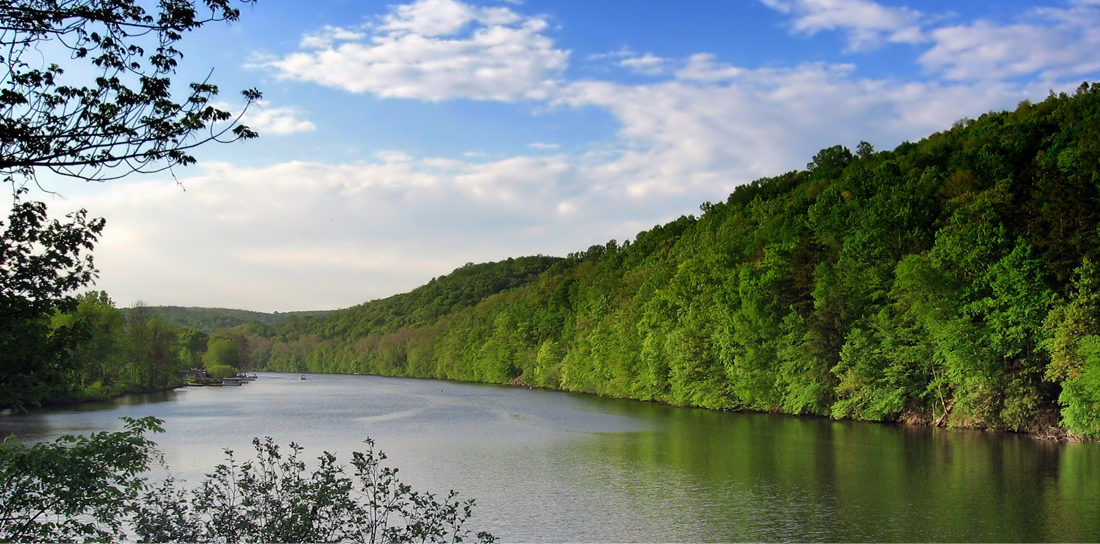In This Issue:
- Big Victory at Lowe's Hardware
- Moms Speak Out
- Zero Waste Boston Update
- Fighting Fracking from PA to MA
- Massachusetts Youth Advisory Board
- Welcome Marisol, Vick, Laura, and Blake
- Biomass Victory in Rhode Island
- In Memoriam: Dave Gerraughty
- Fighting for a Sustainable Water Plan in Connecticut
- 2018 Connecticut Energy Bill Update
- Connecticut Youth Lobby Day
- Download this issue
BIG VICTORY: Lowe’s to End Sale of Toxic Paint Strippers
Following months of campaigning by Clean Water Action and allies at the Mind the Store Campaign, Lowe’s Home Improvement committed to end the sale of toxic paint stripping products globally by the end of 2018! This is great news and an important step as proposed rules to regulate the toxic chemicals in the paint stripping products — methylene chloride and N-methylpyrrolidone (NMP) — have languished at the Environmental Protection Agency (EPA).
Methylene chloride has been linked to nearly 60 deaths following use of paint strippers containing it over the past several years. Several people who died were even wearing masks and respirators which failed to prevent their deaths.
In a statement released by Lowe’s, the company shared its motivation for taking action: “We care deeply about the health and safety of our customers, and great progress is being made in the development of safer and more effective alternatives,” said Mike McDermott, Lowe’s chief customer officer.
Why Lowe’s leadership is important
— Both methylene chloride and NMP are dangerous to consumers. Methylene chloride is linked to several types of cancers as well as liver, kidney, and reproductive toxicity. NMP has been closely linked to developmental impacts including miscarriages.
— Lowe’s is a major home improvement retailer with over 1,700 stores. It is the 8th biggest retailer, nationally. Action from Lowe’s will help protect families from coast to coast by the end of the year, immediately reducing exposure to these dangerous chemicals.
— The EPA and other big retailers like Home Depot will face more pressure to follow the lead of Lowe’s, to take action to protect the health of workers and families across the country.
This is personal: Moms speak out
Methylene chloride made headlines across the country in the spring as families who lost loved ones after using paint strippers that contained the toxic chemical spoke out and urged action.
Joshua Atkins, 31, died in February 2018 while refinishing his BMX bike with a paint stripper containing methylene chloride at his home in Pennsylvania. Joshua’s mother, Lauren Atkins, said, “Not one more mother should go through what I’ve been going through. The EPA should protect Americans from methylene chloride and ban it in paint strippers. Retailers should protect their customers and stop selling these products. My son shouldn’t have died this way and no one else should lose a loved one to these deadly products.”
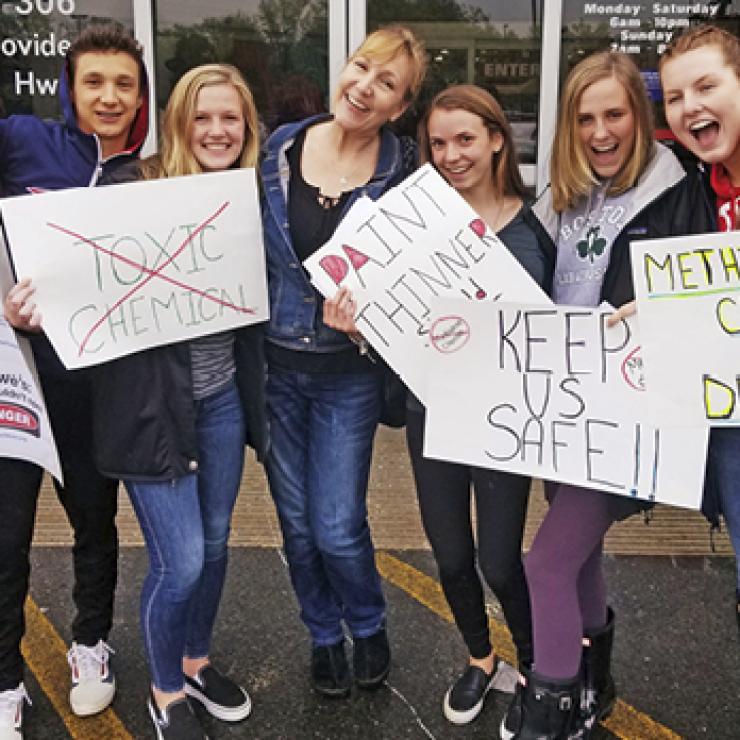
Clean Water Action members and allies jumped into action these past months to urge action from the EPA and retailers alike.
In Connecticut, Coalition for a Safe and Healthy Connecticut members visited two Lowe’s stores, urging managers to stop selling deadly paint stripper products. Steve Schrag, lead organizer for ConnectiCOSH stated “This is a terrific first step to reduce worker exposure and deaths. Now it’s time for other retailers to do the same.” The team plans to return to several local stores to thank Lowe’s for this recent announcement.
Massachusetts strapped on its boots and really showed up for the Lowe’s Week of Action in May. A Clean Water team visited the Lowe’s in Braintree and met with the store manager to share concerns about the dangerous chemicals. New England Director Cindy Luppi joined teen leaders from Medfield to meet with the Dedham Lowe’s manager. Clean Water Action Advisory Board member Sara Moffet visited the Amherst Lowe’s. Kadineyse Paz, Environmental Health and Justice Organizer, shared, “We all feel strongly about the preventable losses that families have faced and are so happy that our participation, along with so many others across the country, was able to have such a big impact on eliminating toxic products from Lowe’s store shelves.”
In Rhode Island, a Clean Water Action outreach team stopped at Lowe’s in Cranston while on the way to organizing efforts in the community. Sydney Darrow, Nicole Paulson, Erik Schlicht, and Sajida Chandoo made shoppers aware of the dangers of these products while Eric Dominguez spoke to the managers of the store. He delivered a heartfelt letter asking the managers to use their influence to get Lowe’s to do the right thing. All are energized by this victory and eager to take on the next challenge.
To all Clean Water Action members who participated, thank you for taking action — you and hundreds more of our members are the reason for this victory!
Massachusetts
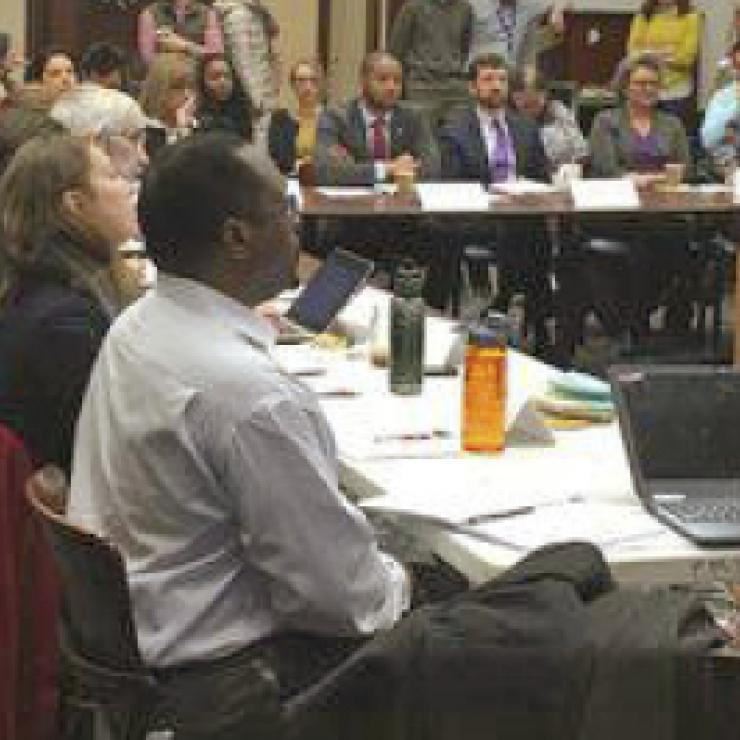
Zero Waste Boston Update
This Spring has been a busy one for zero waste (ZW) advocates in Boston! Clean Water Action and partners in the Zero Waste Boston coalition (ZWB) have been engaging fully in the ZW planning process that the City of Boston has convened after years of campaigning by the coalition. Many far-reaching policy options are being considered by an Advisory Council whose members represent stakeholder groups, and a top-notch consulting team is shepherding the process for the City. Policies under discussion include mandatory residential and commercial recycling, curbside compost pickup, various ways to encourage reuse over disposal and ensuring that lowest bids are not the only factor in awarding waste contracts.
All is not perfect however: ZWB is racing the clock to include fixes for serious deficiencies in the current system, including workers under the city’s recyclables processing contract being excluded from the living wage ordinance, and the entire commercial sector being unregulated by the city. Still, the coalition is optimistic that Boston is creating a national model to capture social and economic benefits for all stakeholders through a sustainable circular economy.
We’re In This Together: Advancing Clean Energy and Fighting Fracking from PA to MA
This spring, Clean Water Action teams in Massachusetts and Pennsylvania have worked to make visible the devastation from hydrofracking on the Pennsylvania end of the pipeline in Washington County, Pennsylvania to residents of Massachusetts. Many in Massachusetts aren’t aware that the region imports a portion of the fuel the state uses from this over-burdened area in Marcellus Shale where hydrofracking is expanding at an accelerated pace.
The first step to shine a spotlight on the damage to Pennsylvania communities from the fracking boom? A speaking tour to highlight grassroots leaders who live at the fence line of this fracking-heavy activity. Among the leaders who traveled to Boston to share their story:
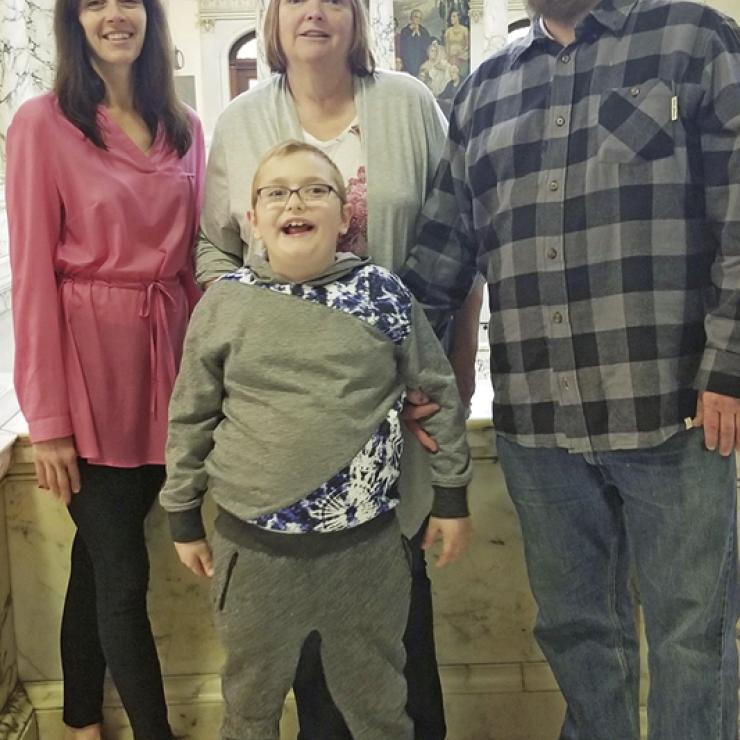
Lois Bauer-Bjornson: Lois moved from Pittsburgh to Scenery Hill, Washington County, Pennsylvania years ago in the hope of a quiet and healthy life with her children. As the fracking industry expanded, she and her four kids now live near two compressor stations, about twenty-eight wells and a gas pipeline. She has documented nosebleeds and other health impacts from fracking, pushed for tighter regulations on methane emissions and worked alongside area environmental health professionals to elevate the risks from gas drilling.
Jane Worthington: Jane is a nurse and hospitality professional and parent of two children. She became an anti-fracking activist after her daughter’s exposure to benzene led to illness.
Bryan Latkanich and son Ryan Latkanich: Bryan is a landowner in Pennsylvania who became sick after he allowed an energy company drill on his land in 2011. Well water quality deteriorated after drilling was initiated.
Following a successful briefing for legislators in which the Pennsylvania team shared how health impacts from the associated air and water pollution are hitting the children in their communities in particular, many state officials spoke out. Representative Stephen Kulik of Worthington, the vice chair of the House Ways and Means Committee, shared that there is strong resistance in the legislature to proposals to have the public finance new gas pipelines. He also stated that Massachusetts should be focused on increasing energy efficiency and expanding solar, offshore wind, and hydro-electricity imports, in part because “the push for more natural gas pipelines will only put more pressure on communities in Pennsylvania that are struggling with the environmental impact of drilling for fracked gas there.”
If you missed the Pennsylvania leaders on their speaking tour, check out this video that shares their stories.
Youth Advisory Board Wraps Up Inaugural Year
Last year, Clean Water Action joined millions of others in witnessing the incredible energy of young people leading from the front during the No Dakota Access Pipeline actions, to produce some of the most dynamic environmental organizing in decades. This was on the heels of the highly successful People’s Climate March in New York City and various other major challenges to the system of polluter control, and Clean Water Action was eager to harness that passion to fuel the work in Massachusetts.

So Clean Water Action launched a Youth Advisory Board (YAB), composed of undergraduate students from several of Boston’s colleges. These young people grappled with the finer points of Clean Water’s body of work, testified effectively at important hearings and helped to develop the group’s structure and program. On Friday, April 20th, the YAB hosted “I’m with her: A climate affair” a celebration and networking event for Boston area youth fighting for environmental justice. Planning and recruitment is under way for next season, and the team hopes to include a cohort of activated high school leaders as well!
Clean Water Action welcomes new staff onto our MA program team!

Marisol Fernández y Mora was a canvasser and trainer in Clean Water’s Northampton, MA office for a year and in March began a new position as the Massachusetts Drinking Water Advocate. Marisol is working with communities to reduce lead and other contaminants in drinking water — in particular environmental justice communities that bear a disproportionate burden of environmental impacts. Originally from New México, Marisol was introduced to the environmental justice movement in high school, and spent time organizing around clean energy replacement in predominantly communities of color.

Vick Mohanka is Clean Water Action’s new Clean Energy Organizer, working for clean energy and climate justice in Massachusetts. Vick most recently worked for the Joint Committee on Telecommunications, Utilities, and Energy in the Massachusetts House of Representatives. There, he focused on clean energy legislation including solar energy, large scale renewable energy procurements, and energy efficiency.

Blake Jeanniton joined the team in late May as Clean Water’s Development Associate. He is a recent graduate from Virginia Polytechnic Institute and State University and has spent time abroad in Ecuador, Spain and China. At home and abroad he has studied and worked for justice and equity for all.

Laura Spark is Clean Water’s new Climate and Health Advocate, working to prevent harm to human health and the environment from toxic chemicals and advance carbon pricing policies in Massachsuetts. Laura has over 25 years of experience working as an urban planner, with a focus on housing, poverty, and sustainability. She has been a Clean Water Action volunteer since 2002 when she came to a lobby day at the Massachusetts State House as pregnant mom to talk about mercury in fish.
Rhode Island
Victory! Dirty Biomass Bill Defeated
Decades ago, Clean Water Action led the charge to pass a bill prohibiting the incineration of waste here in Rhode Island. Over the years, various parties wishing to allow trash-burning plants to be built in our state have tried to overturn the ban, but Rhode Islanders have no stomach for these kinds of dirty facilities. As a result, these efforts have been beaten back each time and Rhode Island’s air remains free from the air pollution incinerators generate.
But those that really want to build them will not be deterred so easily: Earlier this spring, and well past the filing deadline in both chambers of the general assembly, a bill was introduced that would have eliminated a single line of text a 2011 clean energy policy. That bill, which allows producers of renewable energy to sell unused power back in to the grid, was designed to incentivize clean, local renewable energy projects. It also explicitly exempts biomass fuels from being eligible for this kind of credit — this is the language this bill sought to eliminate.
Biomass fuels are made of wood, most commonly split firewood and wood pellets, but also includes construction and demolition debris from building projects. Studies have found biomass fuels to be the dirtiest energy source out there, producing more emissions and toxins than fossil fuels like oil or coal per unit of energy produced. And that’s just clean wood. Construction debris can also contain hazardous substances like lead paint and other toxic chemicals, further polluting the air when burned.
While most legislation moves slowly, the dirty biomass bill did not. It raced through the Senate with overwhelming support and looked to do the same in the House of Representatives. It turns out it was moving so fast because it was submitted at the request of a single energy developer who was a big donor to House and Senate leadership. Not only was this bill terrible for the environment, there were concerns about the impact of a prominent campaign contributor in the mix as well. When the environmental community realized what was going on, it sprang into action.
A coalition of groups, including Clean Water Action, Conservation Law Foundation, Acadia Center, Audubon Society of Rhode Island, and many others sent action alerts to our members, asking them to contact their representative and urge them to vote no on the bill. In just a few days, Clean Water Action members sent nearly 100 messages to members of the House of Representatives voicing their opposition.
This issue also received a significant amount of press coverage, which when combined with our grassroots response and the work of allies in the general assembly, helped us to kill the bill. This was a huge win for the environment and for the power of democracy, and we could not have done it without the support of our members.
In Memoriam: Dave Gerraughty

Clean Water Action has lost a true champion. Dave Gerraughty, our Providence program organizer and field canvass trainer, passed away in April after being diagnosed with pancreatic cancer last summer. Dave had been with us for 7 years and was a tireless voice for the environment and public health in Rhode Island. He helped shepherd several bills through the Rhode Island legislature including the strongest-in-the-nation flame retardant ban that was passed in 2017. Dave was also instrumental in starting the compact fluorescent bulb take-back program in the state.
Dave was particularly good at working with the legislature and the environmental community misses his presence at the state house. Those of us who worked with him in our Providence office most miss his stories about the great members he met when canvassing, his stories about Gretchen — his dog, his incredible enthusiasm for training the next crop of environmental leaders, and hearing about his beloved Red Sox.
To honor Dave’s memory and legacy, we created the David R. Gerraughty Award for Lifetime Commitment to the Environment. This award will be given annually to a member of the Rhode Island environmental community who has demonstrated outstanding work throughout their career. Dave was the first recipient, and it was accepted by his wife, Seely, at our annual Breakfast of Champions in May.
Connecticut
Fighting for a Sustainable Water Plan in Connecticut
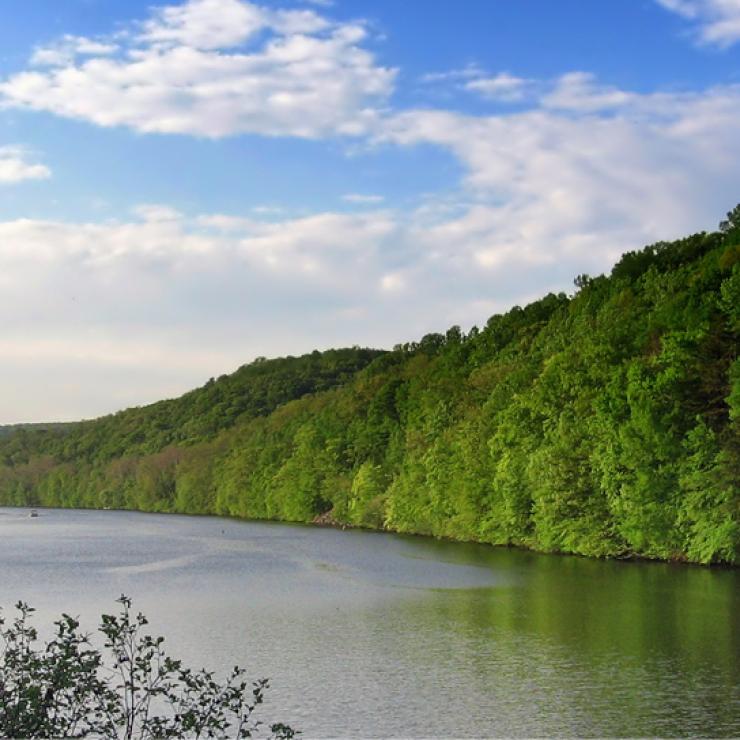
Connecticut has always been a water rich state with abundant sources of clean water for drinking, recreation, and supporting wildlife. But warmer temperatures and changing weather patterns, including a severe months-long drought last year, reminds us that we can’t take this precious resource for granted. Other threats include: a large California-based water bottling plant moving into the state with approval to withdraw 1.8 million gallons per day out of a local reservoir; a proposal by Tilcon, a local concrete and asphalt producer to expand their quarry into a sensitive watershed by pushing for an exemption from current state law; and a push by Eversource, an energy utility, to purchase the Aquarion water company located in southwestern Connecticut.
Connecticut’s first state water plan, required by law in 2016, was designed to serve as a foundation for addressing all of these issues, providing guidance for balancing current and future needs of our water in a changing climate and with competing priorities. Under the law, the Water Planning Council, numerous sub-committees, and consulting experts held hundreds of meetings over the past two years gathering input from stakeholders across the state in the plan’s development. Clean Water Action participated in numerous meetings, provided comments, submitted formal statements to the public dockets, and provided written and oral testimony for the General Assembly in support of the plan.
Unfortunately, the Water Utility Association and the Connecticut Business and Industry Association (CBIA) raised concerns about the State Water Plan’s public trust doctrine and law, which acknowledges air and water as part of the public trust, stating that inclusion of the wording raises concerns about the utilities and businesses abilities to manage water usage. Significant case law exists to direct the application of this doctrine but the concerns raised by the Water Utility Association and CBIA were strong enough to prevent the plan from being voted on by the joint committees, leaving two years of arduous work by the Water Planning Council, advocates and others, with a significant delay in adopting the plan.
Now that the plan is kicked back to the Water Planning Council with little hope of adoption before 2019, Clean Water Action is working to engage members on what happened and build momentum and political will to get it passed in 2019. We believe water is part of the public trust and we want to hear from you. We’ll be hosting community forums around the state and sending information on the latest updates so you can get involved.
2018 Energy Bill Recap
Throughout the first half of 2018, Clean Water Action staff and activists mobilized at the Capitol and across the state, generating calls, emails and letters to Connecticut lawmakers urging bold action on climate change. Thanks to this effort, the General Assembly passed bills that will significantly mitigate greenhouse gas emissions and expand large-scale renewable energy.
Here are the specifics:
- Connecticut committed to a 45% reduction in greenhouse gas emissions by 2030. This aggressive target, recommended by the Governor’s Climate Change Council and supported by Clean Water Action and other advocates, puts us on a path to achieving the state’s long-term climate goals set in the 2008 Global Warming Solutions Act.
- A broad energy bill was passed that will require utilities to purchase 40% of their energy from renewable sources by 2030, doubling the current standard. It also establishes a program of community shared solar which will provide solar access for renters, shade-dwellers and others who can’t go solar on their own buildings.
- New requirements to plan and prepare for sea level rise and build resilient communities were also passed with strong bipartisan support.
But there is more work to do. Despite efforts to fix a provision in the energy bill that will sharply restrict net metering, the bill moved forward with a new approach to rate design that will create a tougher marketplace for rooftop solar. Clean Water Action will work closely with advocates, contractors, and agency officials to address these concerns in upcoming regulatory proceedings, and at the Capitol next year if need be.
Last year’s budget raids to clean energy and energy efficiency programs are already having devastating impacts in these job-creating industries and the implementation of clean energy programs. While it is positive that ten million dollars was restored to energy efficiency programs in the final budget, this does not approach the $175 million that was taken. Energy efficiency is the best way to reduce harmful emissions, to protect the environment and public health.
Clean Water Action will be fighting to protect these funds legislatively next year and in any special session that may be set. On May 15, a lawsuit was filed against the state of Connecticut on behalf of ratepayers to restore these funds and protect them from future raids. Leticia Colon de Mejias of Efficiency for All, a member of Clean Water Action’s Board of Directors, has taken leadership in this powerful action.
Activism from Clean Water Action members made a difference this legislative session, and will be essential to address the gaps in Connecticut’s clean energy policies.
Connecticut’s First Youth Climate Action Lobby Day
This spring, Clean Water Action’s Program Intern Kaitlin Hollinger, a former field canvasser teamed up with CHISPA organizer, Alex Rodriguez and together they mobilized students from UCONN, Trinity and CT River Academy to plan and organize Connecticut’s first Youth Climate Action Lobby Day and Press Event, on April 18th. They provided advocacy training, hosted a well-organized and powerful press event attended by six legislators and urged lawmakers to take bold action on climate change. The day was an overwhelming success, a great learning opportunity for students and powerful message to policy makers.
Read more about Kaitlin’s experience with Youth Climate Action Day on our blog.
